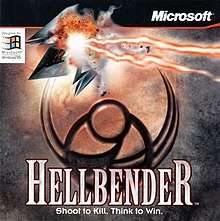Hellbender (video game)
| Hellbender | |
|---|---|
 | |
| Developer(s) | Terminal Reality |
| Publisher(s) | Microsoft Game Studios |
| Producer(s) |
Mark Randel Joseph Selinske |
| Programmer(s) | Mark Randel |
| Composer(s) | Kyle Richards |
| Platform(s) | Windows 95 |
| Release |
|
| Genre(s) | Simulation |
| Mode(s) | Single player, Multiplayer |
Hellbender is a simulation video game developed by Terminal Reality and published by Microsoft Game Studios for Windows 95. It is the sequel to Fury3.[1] A demo version of the game was included on later CD-ROM versions of Windows 95. The voice of the ship's computer was portrayed by Gillian Anderson, who is best known from the TV series, The X-Files.
Gameplay
The player is in control of a prototype spacecraft (the "Hellbender") and must fly it around a map, destroying various targets and reaching checkpoints. There are ten weapons available, corresponding to the numerals 1-0 on a qwerty keyboard. The Valkyrie and Laser cannons have unlimited ammo, but there are also dumbfire Sledgehammer rockets, homing Viper missiles, and devastating Doomsday mines.[2] Many more weapons are available by collecting power-ups during gameplay.
The levels in Hellbender are composed of a few missions that take place on eight different planets. There are typically three missions per planet.
Plot
Six years after the events depicted in Fury3, the Bions (an alien race created by Earth scientists which rebelled and became ruthless killing machines) kill all the Coalition's qualified pilots on Sebek.[2] The player's character ("the Councilor") is the last surviving pilot for the Coalition of Independent Planets, the defense group that protects Earth from the Bions. The Bions are now targeting the rest of the Coalition's citizens. The pilot must accomplish various objectives on eight different worlds in order to stop the Bions, save Earth, and win the game. The storyline is a continuation of the storyline from Fury3.
Reception
Entertainment Weekly gave the game a B- and wrote that "A few years ago, the bigwigs at Microsoft noticed that some canny game companies — such as Origin, with its Wing Commander series — were capturing a big chunk of the PC software market that rightfully belonged to Bill Gates. So the company spent tens of millions to create its own high-tech game division, and the result is discs like Hellbender — a futuristic, heavy-on-the-weaponry air-combat simulator that approximates the level of Wing Commander III (released two years ago). You can't blame Microsoft's programmers for trying, but I'd rather they applied their talents to stuff for which they seem to have more of an affinity, like kids' activity titles and word-processing programs."[3]
External links
References
- ↑ "Hellbender". Next Generation. No. 18. Imagine Media. June 1996. p. 54.
- 1 2 Hellbender CD instruction manual.
- ↑ https://ew.com/article/1996/12/20/hellbender/